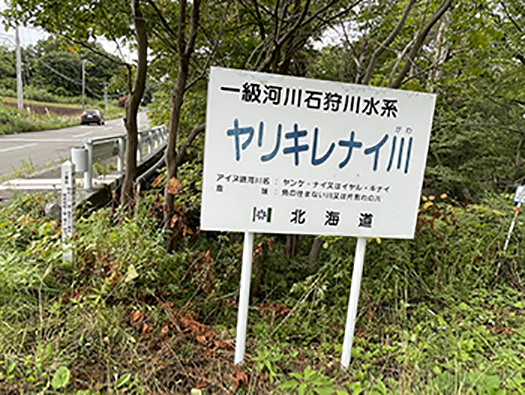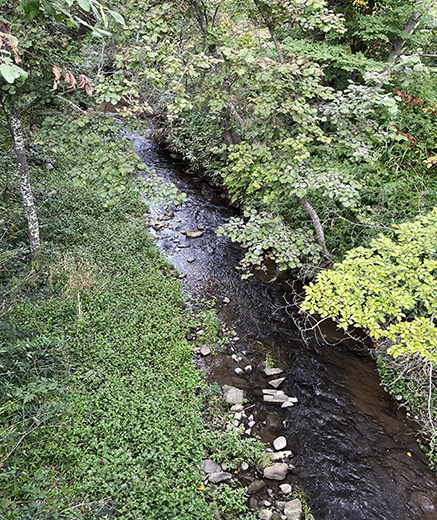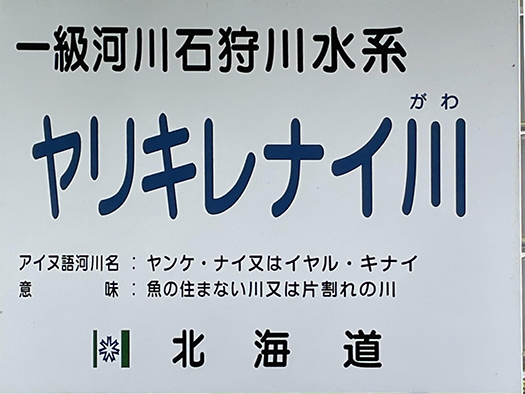


子どもの頃から、北海道の川の名前で「ヤリキレナイ」川というのがあるということは聞いていた。子どもたちの耳に大人たちの「ヤリキレナイ」という言葉に込められた独特の厭世感情を感じて、ああ人生にはなんてイヤなことがあるんだろうと、恐れおののくこころを抱いていた。
そういう大人的なイヤイヤ感を刺激する「川」というのは、なんという怖ろしい川なのかと想像力を掻き立てられ続けてきた。
昨日はカミさんと最近よく野菜類を買い出しに出掛ける北広島市のお隣の長沼町・道の駅へ。またまたコールラビとか、ソー麺カボチャ、収穫期のタマネギ大量買いなどを楽しんでおりました。野菜中心の食事を心がける人間でも最大の楽しみは食なので、せめてもこういう楽しみを持つと幸せを感じさせてくれる(笑)。野菜のバラエティに目覚めると、これまた奥が深いのです。
で、長沼からカミさんの発案で隣接の栗山町の日帰り温泉に向かった次第。カーナビに入力して向かったのですが、北海道生まれ育ちのわたしたちにも、まわりの風景がちょっと違う。なんか無性に「なつかしさ」に満ちているけれど、車窓からの風景感が新鮮。
到着してからも、栗山のJR駅(苫小牧から岩見沢まで)の路線も乗ったことがないことに気付いた。ということで一種の迷宮に迷い込んだ感があって、栗山町の歴史資料館にまで探訪してしまっていた。これは面白い新発見。「いいね、こういうの」ということで高齢者のあらたな楽しみ領域発見になった。
・・・その「探訪結果」についてはまたにして、その後カーナビに自宅を目的地として登録し、帰り道を走り始めた。栗山町から江別東の高速ICを目指して走り始めて十数分、上の写真のような「案内板」と遭遇してしまったのであります。「おお」
さっそくクルマを降りて(カミさんは無関心に車内残留)写真撮影などをしていたのであります。
ふつうはWEB検索などをかけて疑問点は解決することができますが、この「ヤリキレナイ」川についてはこの案内板ではじめて少年期からの疑問点が解決してくれた。アイヌ語の「ヤンケ・ナイ、またはイヤル・キナイ」が直接の語源だそうで、「魚の住まない川、または片割れの川」という意味。さらに片割れの川という意味は「近くに流れる由仁川と双生児の片割れ」ということだそうです。
しかしイヤル・キナイという言葉からは「やる気がない」とも受け取れそうでいよいよ面白い。こういうアイヌ語に、やりきれないという日本語を宛てたのも秀逸。「北海道の民俗」を志向しているわたしには、こういったユーモア精神はひとつの手掛かりとも思えている次第です。さてどうかなぁ・・・。
English version⬇
Finally discovered: The legendary “Yarikirenai” river.
The river that bears the pessimistic murmurings of adults who sigh, “No, no, I can’t do it anymore. We finally step into the reality of the fear in children’s hearts. A gentle murmur. A gentle murmur.
Ever since I was a child, I had heard that there was a river in Hokkaido called “Yarikirenai” river. As a child, I felt the peculiar pessimistic feeling that adults put in the word “yarikirenai” in my ears, and I had a fearful feeling in my heart that, oh, what an unpleasant thing there is in life.
The “river” that stimulates such a sense of dislike in adults has always stirred my imagination as to what kind of a scary river it is.
Yesterday, my wife and I went to a roadside station in Naganuma, a town next to Kita Hiroshima City, where we often go shopping for vegetables these days. We enjoyed buying kohlrabi again, somen squash, and a large quantity of onions in the harvest season. Even for those of us who try to eat a vegetable-based diet, the greatest pleasure is food, so at least having this kind of pleasure makes me feel happy (laughs). When you wake up to the variety of vegetables, it is also very deep.
So, at my wife’s suggestion, we left Naganuma for a day trip to a hot spring in the neighboring town of Kuriyama. We entered the information into the car navigation system and headed there, but even for those of us born and raised in Hokkaido, the scenery around us was a little different. It was filled with a sense of nostalgia, but the scenery from the car window was fresh and new.
After arriving at the station, we realized that we had never ridden the JR line in Kuriyama (from Tomakomai to Iwamizawa). This gave me a sense of being lost in a kind of labyrinth, and I even ended up exploring the Kuriyama Town History Museum. This was an interesting new discovery. This was an interesting new discovery for the elderly.
After that, I registered my home as my destination in the car navigation system and started driving home. Ten minutes after I started driving from Kuriyama-cho to the highway IC of Ebetsu-higashi, I came across the “information board” as shown in the photo above. Oh!
I immediately got out of the car (my wife remained indifferently in the car) and started taking pictures.
Usually, I can solve my questions by searching on the web, but this information board was the first time for me to solve my questions about the “Yarikirrenai” River since I was a young boy. It is said to be directly derived from the Ainu word “yanke nai, or Iyarukinai,” meaning “a river where no fish live, or a river with one half. Furthermore, the meaning of “one half of a river” is said to mean “one half of a twin to the Yuni River that flows nearby.
However, it is interesting to note that the word iyar kinai can also be taken to mean “unwillingness to do something. It is also excellent that the Japanese word for “unwillingness” was added to the Ainu word. As I am interested in the “folklore of Hokkaido,” this kind of humorous spirit is one of the clues I am looking for. I wonder how it will turn out….
Posted on 9月 22nd, 2024 by 三木 奎吾
Filed under: 日本社会・文化研究







コメントを投稿
「※誹謗中傷や、悪意のある書き込み、営利目的などのコメントを防ぐために、投稿された全てのコメントは一時的に保留されますのでご了承ください。」
You must be logged in to post a comment.